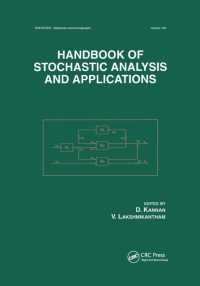- ホーム
- > 洋書
- > ドイツ書
- > Mathematics, Sciences & Technology
- > Mathematics
Full Description
This book is a thoroughly revised result, updated to mid-1995, of the NATO Advanced Research Workshop on "Intelligent Learning Environments: the case of geometry", held in Grenoble, France, November 13-16, 1989.







